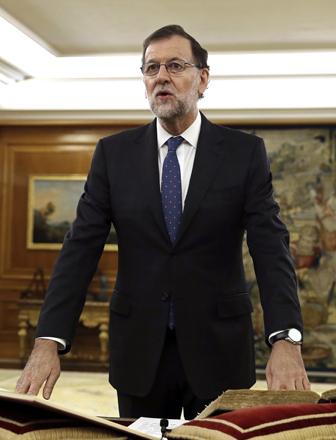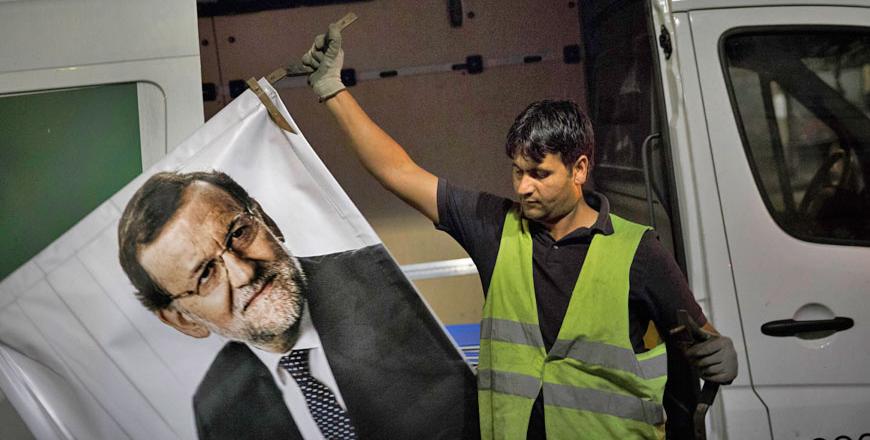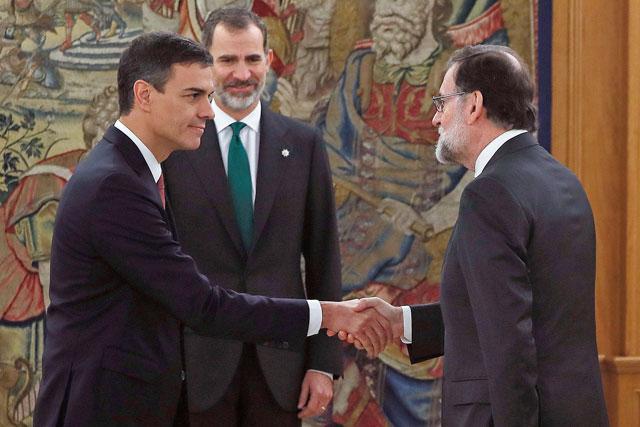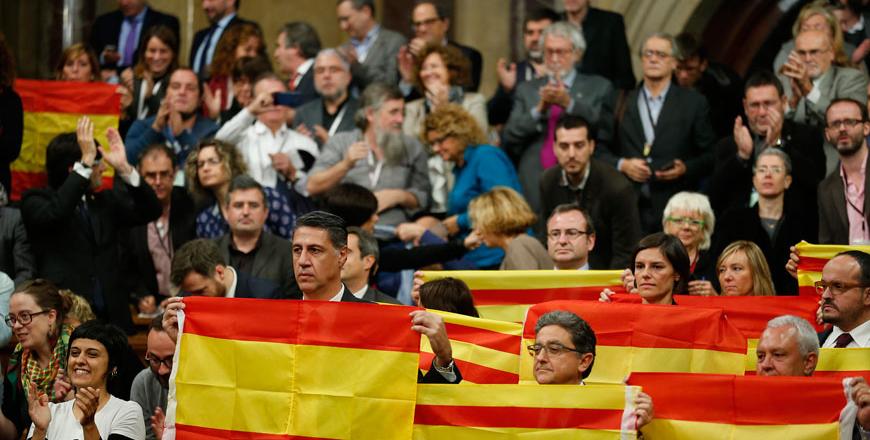You are here
Spain's Rajoy sworn in as PM, minority gov’t may struggle
By Reuters - Oct 31,2016 - Last updated at Oct 31,2016

Mariano Rajoy takes the oath as prime minister at the Zarzuela Palace in Madrid, Spain, on Monday (AP photo)
MADRID — Mariano Rajoy was sworn in for a second term as Spain's prime minister on Monday, but his minority administration may struggle to govern effectively and heal scars left by 10 months of political deadlock.
The conservative leader took his oath of office before King Felipe at the Zarzuela Palace near Madrid after winning a parliamentary confidence vote on Saturday, giving Spain a fully-functioning government once again after two inconclusive elections and fruitless coalition talks.
Spanish government bond yields fell on Monday, but the slump was limited by lingering investor concerns over the country's ability to implement economic reforms and rein in public spending.
Rajoy, who has the weakest mandate in Spain's modern history, is working on a new Cabinet that must build cross-party support to pass reforms in a hostile parliament.
His team, to be announced on Thursday, will be scrutinised for signs he wants a fresh start by bringing in new faces, even if most are expected to come from his People's Party (PP). There were no immediate leaks on the new Cabinet to the Spanish press.
Rajoy, 61, governed with an absolute majority in his first term and was often disdainful of the opposition. Now he must convince opposition parties he is genuine about working with them.
Credit rating agency Fitch said the formation of a new government reduced political uncertainty but that significant risk remained.
It said the minority government would face a challenge securing support for its policy agenda, making substantial new structural reform unlikely, and there was also a strong chance that the government would not be able to complete a full term.
Spain suffered a severe recession during Rajoy's first term, when its banks needed a 41 billion euro ($45 billion) European bailout, but the economy is now recovering.
Public disaffection
The fragmentation of Spain's parliament arose from widespread disillusion with the political establishment and the emergence of new parties at a time of economic hardship, with unemployment peaking at 27 per cent, and anger over corruption.
Rajoy has said he is open to dialogue and negotiation but in an uncompromising speech before Saturday's vote, he urged opponents not to tie his hands, saying: "Spain ... needs a government that is capable of governing".
He will enjoy backing from the liberal Ciudadanos (Citizens) Party, the fourth-largest group in parliament, on a list of 150 previously agreed measures.
"Whatever government there is, there will be a change of direction and there will be reform measures," Ciudadanos lawmaker Jose Manuel Villegas told reporters on Monday.
But even with Ciudadanos' 32 votes added to the PP's 137, Rajoy lacks a majority in the 350-seat parliament. He faces hardline opposition from anti-austerity Podemos, the third largest party in the assembly.
The Socialists, the second biggest, are licking their wounds over their leaders' decision to permit a Rajoy government after earlier blocking him. The party opened disciplinary proceedings on Monday against 15 Socialist lawmakers who defied the party line and voted against Rajoy in Saturday's confidence vote.
The new government will be weak with every measure entailing "endless and draining" negotiations, Edoardo Campanella, an economist with Italian bank UniCredit, said in a note.
Rajoy will be confronted by urgent issues including setting a new budget for 2017 to appease the European Commission and meet next year's deficit targets, which will require either spending cuts or raising extra revenue.
Rajoy will also have to grapple with an independence campaign by the wealthy northeastern Catalonia region, which plans a referendum next year on breaking away from Spain.
Related Articles
MADRID — Spain's Prime Minister Mariano Rajoy faced an uphill battle to stay in power on Monday after his conservatives lost their majority
MADRID — Socialist Pedro Sanchez took over as Spain's prime minister on Friday, after outgoing leader Mariano Rajoy lost a parliamentary con
MADRID — Catalonia's regional assembly on Monday passed a resolution calling for secession from Spain, energising a drive towards independen















